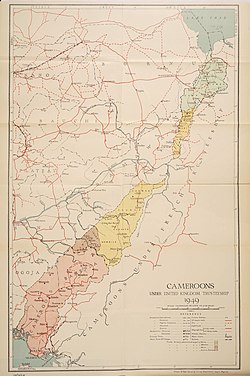British Cameroon
British Cameroon | |||||||||||
|---|---|---|---|---|---|---|---|---|---|---|---|
| 1916–1961 | |||||||||||
| Anthem: "God Save the King" | |||||||||||
 British Cameroon in 1949. | |||||||||||
| Status | League of Nations mandate, then a United Nations trust territory under British rule | ||||||||||
| Capital | Buea | ||||||||||
| Common languages | English | ||||||||||
| Religion | Islam Christianity | ||||||||||
• 1916–???? (first) | Kenneth V. Elphinstone | ||||||||||
• 1956–1961 (last) | Sir John Osbaldiston Field | ||||||||||
| History | |||||||||||
• Kamerun is occupied by France and Britain. | 1916 | ||||||||||
• Treaty of Versailles : Germany renounces its rights over Kamerun | 1919 | ||||||||||
• British mandate | 20 July 1922 | ||||||||||
• Union of Northern Cameroons with Nigeria | 31 May 1961 | ||||||||||
• Union of Southern Cameroons with Cameroon | 1 October 1961 | ||||||||||
• Disestablished | 1 October 1961 | ||||||||||
| Currency | British West African pound | ||||||||||
| |||||||||||
| Today part of | Cameroon Nigeria | ||||||||||
British Cameroon or the British Cameroons was a British-controlled League of Nations mandate later United Nations trust territory. The territory was originally a German protectorate known as Kamerun. During World War I, it was occupied by British, French and Belgians troops. Following the defeat of Germany, the German protectorate was placed under a League of Nations mandate entrusted to the administration of France for its eastern part and the United Kingdom for its western part.
France controlled most of the former German protectorate (four fifths of it) and was named French Cameroon, while the United Kingdom controlled the rest to the west next to Nigeria, which was under British rule since 1901.
Following the independence of Cameroon and Nigeria in 1960, a referendum was held in the British Cameroons under the supervision of the United Nations. People were asked whether they would like to achieve independence by joining Nigeria or by joining Cameroon.
The northern part of the British Cameroons (Northern Cameroons) decided to join Nigeria and the southern part of the British Cameroons (Southern Cameroons) decided to join Cameroon.[1][2]
Today the Northern Cameroons forms part of the Adamawa, Borno and Taraba states of Nigeria[3] while the Southern Cameroons forms part of the Northwest and Southwest regions of Cameroon.
References[change | change source]
- ↑ Njung, George N. (2019-12-01). "The British Cameroons Mandate Regime: The Roots of the Twenty-First-Century Political Crisis in Cameroon". The American Historical Review. 124 (5): 1715–1722. doi:10.1093/ahr/rhz1025. ISSN 0002-8762.
- ↑ "British Cameroons Mandate". www.britishempire.co.uk. Retrieved 2022-12-10.
- ↑ PRNigeria (2019-04-20). "The Nigerian States that Formed Parts of Northern Cameroons". PRNigeria News. Retrieved 2022-12-10.


